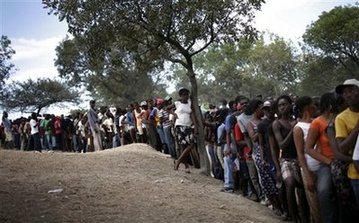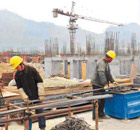Global General
2 weeks after Haiti quake, food aid falls short
(Agencies)
Updated: 2010-01-28 11:55
 |
Large Medium Small |
PORT-AU-PRINCE, Haiti: Whether locked up in warehouses or stolen by thugs from people's hands, food from the world's aid agencies still isn't getting to enough hungry Haitians, leaving the strongest and fittest with the most.
 A woman leans against a tree as she waits with others for food rations in the aftermath of the January 12 earthquake in Port-au-Prince, Wednesday, January 27, 2010. [Agencies] |
"If it rains now, that's it," Wilson St. Ellis, 50, a father of eight, said Wednesday amid plastic sheets stretched here and there as flimsy shields against the elements.
Where donated rice, beans or ready-to-eat meals are being distributed, crowds quickly become unruly, with young men pushing ahead and grabbing food bags from women and the weak. UN peacekeepers fire pepper spray and Haitian police swing sticks to restore control.
"These people are just hungry," UN spokesman Vincenzo Pugliese said of the thousands thronging food distribution points, where he said UN peacekeepers were reinforcing security.
Food remains scarce for many of the neediest survivors despite the efforts of the United Nations, the US military and dozens of international aid groups. Relief experts say the scale of this disaster and Haiti's poor infrastructure are presenting unprecedented challenges, but Haitian leaders complain coordination has been poor.
"Many mistakes have to be rectified in order to bring help to the people who need it," President Rene Preval complained to reporters.
In a bid to improve food distribution, representatives of the UN, the US, the Haitian government and private aid groups met Wednesday, and afterward Donal Reilly of Catholic Relief Services said they decided to divide Port-au-Prince into zones, designating a major aid agency to be responsible for delivering UN food to each sector.
Meanwhile, in a stunning development so long after the 7.0-magnitude tremor collapsed thousands of buildings in Port-au-Prince and beyond, French rescuers pulled a 17-year-old girl Wednesday from the rubble of a home near the destroyed St. Gerard University.
The last confirmed such rescue occurred Saturday, 11 days after the quake, when a man was extricated from the ruins of a hotel grocery store. A man pulled from rubble Tuesday said he had been trapped not on Jan. 12, the day of the quake, but during an aftershock. At least 135 people have been unearthed by rescue teams since the quake, which killed an estimated 200,000 people.
On food aid, the UN World Food Program (WFP), which says it has reached 450,000 people, urgently appealed to governments for more cash for Haiti supplies — $800 million to feed 2 million people through December, more than quadruple the $196 million already pledged.
The food agency says rising tensions and security incidents - "including people rushing distribution points for food" - have hampered deliveries. But since the massive relief effort's first days, other problems have also delayed aid - blocked and congested roads, shortages of trucks, a crippled seaport and an overloaded Port-au-Prince airport.
The senior US officer in Haiti said Haitian families simply cannot rely on any particular location for rations.
Food is "flooding" into the city, Lt. Gen. Ken Keen told reporters, "but it's being delivered pretty much in terms of where we can get to and where we can distribute it," not always in locations that are "sustained every day."
At some regular distribution points, such as near the Champs de Mars, the central plaza where thousands of homeless are living, daily food handouts have drawn crowds of frantic people. Desperation boiled over earlier this week and Uruguayan peacekeepers retreated as young men rushed forward to grab US-donated bags of beans and rice. A pregnant woman collapsed and was trampled.
Elsewhere as well, the strong have preyed on the weak, prying donated food from their arms.
"These things should be done is a systematic way, not a random way," said Dr. Eddy Delalue, who runs a Haitian relief group, Operation Hope. "It's survival of the fittest: The strongest guy gets it."
At one squatter settlement Julia Jean-Francois, 25, clutching a grocery bag filled with small packets of donated water, told of her encounter with food robbers.
"I lost all the rice, beans and oil that were distributed last week. A group of young men shoved me and grabbed the bags and ran away," said Jean-Francois, whose mother was killed in the quake.
An hour later, she said, one of the men returned and offered to sell her the same food for the equivalent of $18. She refused, relying instead on a communal kitchen she formed with homeless neighbors.
She said Haitian police patrolling nearby did nothing while people were robbed. "We complained, and they got into their truck and left," she said.
As she spoke Wednesday, a gang of youths pushed into a line of people waiting for water, shoving an elderly woman, who screamed and swung her bucket at their heads.
Port-au-Prince street vendors can be seen openly selling US-donated rice by the cupful from bags marked "not for resale."
Fears of official corruption surrounding the food aid also are surfacing.
Paul Coroleuski of the US-based Convoy of Hope, which has distributed aid in Haiti for three years, said he has more than 100 tons of food in a Port-au-Prince warehouse ready to hand out, but it has been delayed for days by Haitian officials who say they will take over distribution.
Private agencies like his worry that Haitian officials "will do what they always have done, which is the government takes care of the government and the people are secondary," he said.
Haitian officials denied the government plans to take over food distribution from private agencies.
Coroleuski's frustration and distrust of the government is echoed in Port-au-Prince's streets.
"If they turn it over to the Haitian government, they would take it all for themselves," said Muller Bellegarde, 30, as he waited for food in the unrelenting tropical sun.
Haitians remember that when the government took charge of delivering international aid to the city of Gonaives after deadly hurricane floods in 2008, much of it ended up sold on the black market.













